


|
 |
|
| Film Industry |
Film
Pages in Sixties City
|
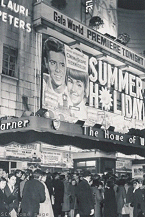 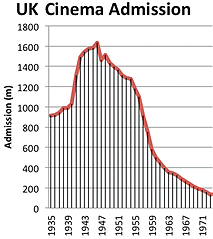 |
The
rapidly expanding competition from the new television business had advanced
unchecked on the film industry since the Fifties and, between the mid-50s
and 1960, cinema admissions had been reduced by half. This was particularly
due to the introduction of regional independent television companies which
began to acquire and broadcast many fairly new films compared to the BBC's
traditional studio-based variety entertainment output. Also, with almost 'instant' news available daily, the cinematic newsreel programme slowly died out and this, along with a shortage of American films, led to a major reduction in the number of cinemas able to survive financially. By the mid-Sixties, a significant proportion of the population owned television sets and preferred to be entertained in the comfort of their own homes. The failing cinemas were being mothballed, demolished or converted into bingo halls, bowling alleys and dance hall/ballrooms. The home market for British-made films was shrinking and the industry had to learn the art of making their output more acceptable to a wider variety of audiences, both British and international, in order to survive. The success of these new films such as 'Lawrence of Arabia' (1962), 'Tom Jones' (1963), 'Becket' and 'Zulu' (1964) and 'Those Magnificent Men in Their Flying Machines' (1965), both encouraged and attracted a significant American investment into British film production. Home-grown male actors such as Kenneth More, Richard Burton, Jack Hawkins, Peter Finch, Laurence Harvey and Richard Todd maintained or increased their international appeal but female actresses of the same stature were few and far between during this period. |
Local
Cinemas Film
Censorship Gerry
Anderson Productions
Science Fiction Films Japanese Sci-Fi, SuperGiant & Kaiju Eiga Pop, Music & Youth Culture Films Hammer Studios Films & History The Man From U.N.C.L.E. Films & TV James Bond & Super Spies The Beach Movies Elvis Presley Films Carry On Films & TV Movie Musicals Also see:
|
| American
directors such as Joseph Losey (blacklisted in America), Stanley Kubrick
and Richard Lester were regularly working in Britain throughout the Sixties,
producing cult and classic films such as 'The Knack', 'A Hard Day's Night',
'Help!' and '2001 - A Space Odyssey'. The special effects talent brought
together by this particular 1968 production was to significantly enhance
the British film industry's importance in this art over the following years. Other foreign directors and producers such as Roman Polanski - 'Repulsion' (1965) and 'Cul-de-Sac' (1966) - were also attracted to Britain at this time. Italian director Michelangelo Antonioni made 'Blowup' with David Hemmings and Vanessa Redgrave in 1966 and François Truffaut directed the only film he made outside of France when he made the classic 'Fahrenheit 451' in 1966. |
 |
|
Four
of the Sixties 'Academy Award' winners for 'Best Picture' were British film
productions. Concurrently,
Albert 'Cubby' Broccoli and Harry Saltzman spectacularly combined the more
relaxed attitude towards sex with exotic locations, explosive violent action
and a self-effacing style of humour in the incredibly successful 'James
Bond' series of movies. 'Dr. No' - the first film (1962) - was really only
a British hit, initially. The following year 'From Russia With Love' was received with much more international interest and 'Goldfinger' (1964) was a worldwide smash hit, as were all the subsequent productions. Their box office success led to a plethora of 'spy' films in various guises including action ('Deadlier Than The Male'), spoof (Monica Vitti's 'Modesty Blaise' and James Coburn's 'Flint' series) and rather more serious interpretations such as Michael Caine's superb, very British 'Harry Palmer' character in 'The Ipcress File', 'Funeral In Berlin' and 'Billion Dollar Brain' films. An upcoming, young generation of filmmakers and artists who would appeal to the virtually untapped potential of youth audiences of the 60's were one of the 'brave new' hopes for the indigenous industry and, coinciding with the change in youth culture, they came into their own as film censorship reduced its old 'hard line' blanket prohibitions, allowing the use of increasingly free speech, more overt sexuality and innuendo and previously 'forbidden' subjects such as homosexuality, abortion and illegitimacy. This prompted an increase in studio output in many directions, but most noticeably three: The 'Pop Movie' which used the media as a vehicle to carry the British 'Beat Boom' explosion to a much wider visual audience; the British 'farce' genre of innuendo and postcard humour of the 'Carry On' film series that carried the baton on from the 'Doctor' film series of the Fifties, and a whole range of 'new wave' youth and working-class culture films, generally known as 'kitchen sink', that challenged the conventions of British society such as: 'Peeping Tom' (1960); 'Saturday Night, Sunday Morning' (1960); 'A Taste Of Honey' (1961); 'A Kind of Loving' (1962); 'The Loneliness of the Long Distance Runner' (1962); 'The Leather Boys' (1963); 'Billy Liar' (1963); 'This Sporting Life' (1963); 'The Caretaker' (1963); 'Morgan - A Suitable Case for Treatment' (1966); 'Georgy Girl' (1966); 'Alfie' (1966); 'Up The Junction' (1968); 'Women in Love' (1969) and the completely bizarre 'If...' (1969). |
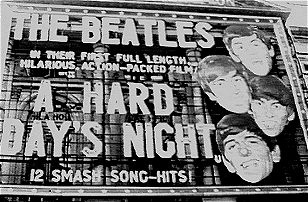 |
 |
The American film
industry was subject to many financial difficulties and, during the Sixties
and early Seventies, there were many takeovers of 'independent' studios
by corporate conglomerates. In 1962 MCA (Music Corporation of America) acquired
Universal-International Studios (Universal-International-Decca) in a merger.
In 1966, Gulf+Western Industries bought the failing Paramount and in 1967,
Bank of America absorbed United Artists through its subsidiary, Transamerica
Corporation. In the same year Jack Warner sold his controlling interest in Warner Bros. to the Canadian production and distribution corporation Seven Arts and was re-named Warner Bros-Seven Arts. This new company also acquired Atlantic Records, but was sold in 1969 to Kinney National Services Incorporated and the studio was renamed Warner Communications in 1971. 1968 saw Avco, an aviation and financial services company, acquired Embassy Films from its founder, Joseph E. Levine. |
| Canadian
Nat Taylor, who twinned the Elgin Theatre in Ottawa, in December 1947, creating
the 800 seat Elgin and 350 seat Little Elgin theatres, may be credited as
the inventor of the 'multiplex' cinema but these initially showed the same
film on both screens, eventually screening two separate features. American
Stanley H. Durwood instigated a 'multiplex' cinema in 1963 when he opened
the custom-built multiplex, at Ward Parkway Center in Kansas City, comprising
two side-by-side theatres with 700 seats. Three years later he introduced
the first 'four-plex' and, in 1969, a 'six-plex' with automated projection
facilities. There are a few other competitors for the title as well! Many Odeons were inexpensively converted into 'triples', without closing, by blocking off the rear stalls and subdividing the space into two small cinemas while continuing to use the balcony and existing screen as the main auditorium while work progressed. These conversions sometimes provided poor sightlines and tiny screens downstairs and also had considerable problems with sound penetration. Many ABC cinemas closed completely for more substantial conversion into three auditoria, all with new screens, to create greater capacities. There was a gradual move to separate performances instead of the traditional continuous ones and, for safety reasons,to the elimination of smoking. |
 |
| Circlorama Circlorama was constructed in seven weeks and opened in May 1963 by Leonard Urry and Leon Heppner, showing a film called 'Russian Roundabout', followed in 1964 by 'Circlorama Cavalcade'. It was built on a bomb site in Denman Street (on the site of the old Monico building) with an entrance on Piccadilly Circus, and was a 360 degree experimental cinema where the screen surrounded the audience, a fore-runner of IMAX. The auditorium was 70ft wide, with room for 500 spectators, and was served by eleven 16mm projectors (not the planned 35mm) and a nine track stereo system. It closed in 1965, re-opening in April the following year as The Classic, a more conventional cinema that survived until 1976. 'Circlorama' was also installed at the end of Blackpool pier for a limited period, showing a feature that included The Swingin' Blue Jeans. |
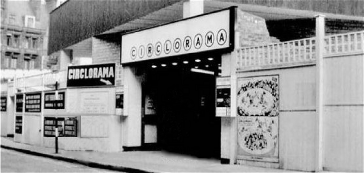 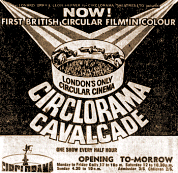 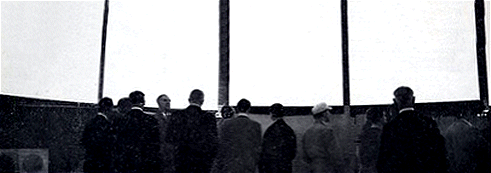 |
 |
A
few of my personal, local memories: The Harlow Odeon was converted into
a 3-screen cinema. The St.Albans Odeon has been closed since the Nineties
after being converted into a multi-screen cinema and, later, a bingo hall.
However, it is currently the subject of the Odyssey renovation
project! The prettiest St.Albans cinema, The Gaumont, is sadly, no longer with us...... nor is The Chequers where I first saw 'A Hard Day's Night', although the building structure remains. |
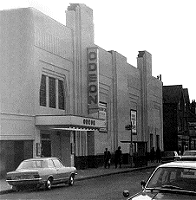 The Odeon, St.Albans, Herts |
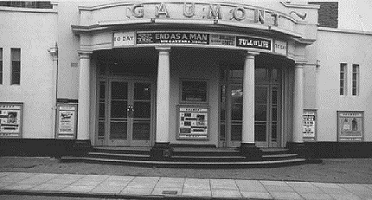 The Gaumont, St.Albans, Herts |
 The Odeon, Barnet, Herts |
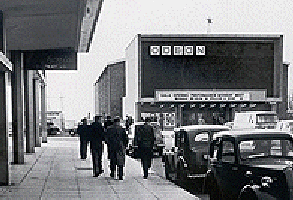 The Odeon, Harlow, Essex 1960 |
|
 The Embassy, Harpenden, Herts |
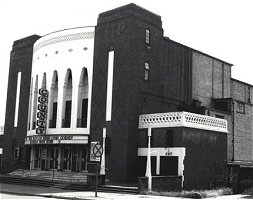 The County, Hertford, Herts |
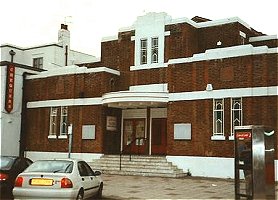 The Regent / Odeon / Classic / Curzon / Chequers, Hatfield, Herts |
 The Gaumont, Watford, Herts |
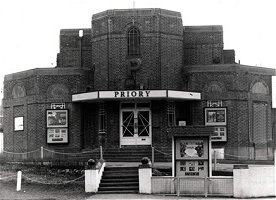 The Priory, Royston, Herts |
| 1960 Best Film: The Apartment Nominations: The Alamo, Elmer Gantry, Sons and Lovers, The Sundowners Best Actor: Burt Lancaster (Elmer Gantry) Nominations: Trevor Howard (Sons and Lovers), Jack Lemmon (The Apartment), Laurence Olivier (The Entertainer), Spencer Tracy (Inherit the Wind) Best Actress: Elizabeth Taylor (Butterfield 8) Nominations: Greer Garson (Sunrise at Campobello), Deborah Kerr (The Sundowners), Shirley MacLaine (The Apartment), Melina Mercouri (Never on Sunday) Best Supporting Actor: Peter Ustinov (Spartacus) Nominations: Peter Falk (Murder, Inc.), Jack Kruschen (The Apartment), Sal Mineo (Exodus), Chill Wills (The Alamo) Best Supporting Actress: Shirley Jones (Elmer Gantry) Nominations: Glynis Johns (The Sundowners), Shirley Knight (The Dark at the Top of the Stairs), Janet Leigh (Psycho), Mary Ure (Sons and Lovers) Best Director: Billy Wilder (The Apartment) Nominations: Jack Cardiff (Sons and Lovers), Jules Dassin (Never on Sunday), Alfred Hitchcock (Psycho), Fred Zinnemann (The Sundowners) |
 |
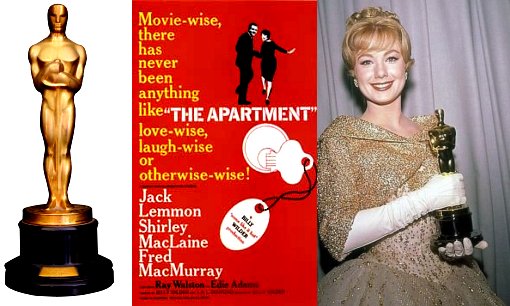 |
| 1961 Best Film: West Side Story Nominations: Fanny, The Guns of Navarone, The Hustler, Judgment at Nuremberg Best Actor: Maximilian Schell (Judgment at Nuremberg) Nominations: Charles Boyer (Fanny), Paul Newman (The Hustler), Spencer Tracy (Judgment at Nuremberg), Stuart Whitman (The Mark) Best Actress: Sophia Loren (Two Women) Nominations: Audrey Hepburn (Breakfast at Tiffany's), Piper Laurie (The Hustler), Geraldine Page (Summer and Smoke), Natalie Wood (Splendor in the Grass) Best Supporting Actor: George Chakiris (West Side Story) Nominations: Montgomery Clift (Judgment at Nuremberg), Peter Falk (Pocketful of Miracles), Jackie Gleason (The Hustler), George C. Scott (The Hustler) Best Supporting Actress: Rita Moreno (West Side Story) Nominations: Fay Bainter (The Children's Hour), Judy Garland (Judgment at Nuremberg), Lotte Lenya (The Roman Spring of Mrs. Stone), Una Merkel (Summer and Smoke) Best Director: Jerome Robbins and Robert Wise (West Side Story) Nominations: Federico Fellini (La Dolce Vita), Stanley Kramer (Judgment at Nuremberg), J. Lee Thompson (The Guns of Navarone), Robert Rossen (The Hustler) |
 |
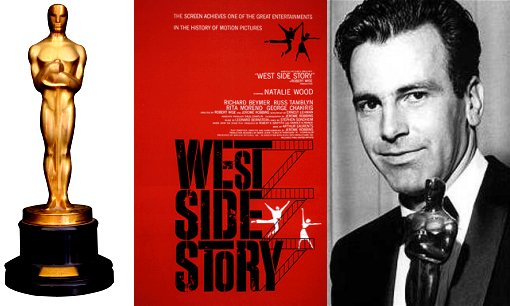 |
| 1962 Best Film: Lawrence of Arabia Nominations: The Longest Day, The Music Man, Mutiny on The Bounty, To Kill A Mockingbird Best Actor: Gregory Peck (To Kill A Mockingbird) Nominations: Burt Lancaster (Birdman of Alcatraz), Jack Lemmon (Days of Wine and Roses), Marcello Mastroianni (Divorce - Italian Style), Peter O'Toole (Lawrence of Arabia) Best Actress: Anne Bancroft (The Miracle Worker) Nominations: Bette Davis (What Ever Happened to Baby Jane?), Katharine Hepburn (Long Day's Journey Into Night), Geraldine Page (Sweet Bird of Youth), Lee Remick (Days of Wine and Roses) Best Supporting Actor: Ed Begley (Sweet Bird of Youth) Nominations: Victor Buono (What Ever Happened to Baby Jane?), Telly Savalas (Birdman of Alcatraz), Omar Sharif (Lawrence of Arabia), Terence Stamp (Billy Budd) Best Supporting Actress: Patty Duke (The Miracle Worker) Nominations: Mary Badham (To Kill a Mockingbird), Shirley Knight (Sweet Bird of Youth), Angela Lansbury (The Manchurian Candidate), Thelma Ritter (Birdman of Alcatraz) Best Director: David Lean (Lawrence of Arabia) Nominations: Pietro Germi (Divorce - Italian Style), Robert Mulligan (To Kill a Mockingbird), Arthur Penn (The Miracle Worker), Frank Perry (David and Lisa) |
 |
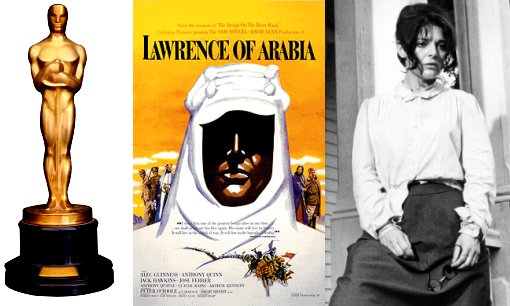 |
|
1963 Best Film: Tom Jones Nominations: America, America, Cleopatra, How The West Was Won, Lilies of the Field Best Actor: Sidney Poitier (Lilies of the Field) Nominations: Albert Finney (Tom Jones), Richard Harris (This Sporting Life), Rex Harrison (Cleopatra), Paul Newman (Hud) Best Actress: Patricia Neal (Hud) Nominations: Leslie Caron (The L-Shaped Room), Shirley MacLaine (Irma La Douce), Rachel Roberts (This Sporting Life), Natalie Wood (Love with the Proper Stranger) Best Supporting Actor: Melvyn Douglas (Hud) Nominations: Nick Adams (Twilight of Honor), Bobby Darin (Captain Newman, M.D.), Hugh Griffith (Tom Jones), John Huston (The Cardinal) Best Supporting Actress: Margaret Rutherford (The V.I.P.s) Nominations: Diane Cilento (Tom Jones), Edith Evans (Tom Jones), Joyce Redman (Tom Jones), Lilia Skala (Lilies of the Field) Best Director: Tony Richardson (Tom Jones) Nominations: Federico Fellini (8 1/2), Elia Kazan (America, America), Otto Preminger (The Cardinal), Martin Ritt (Hud) |
 |
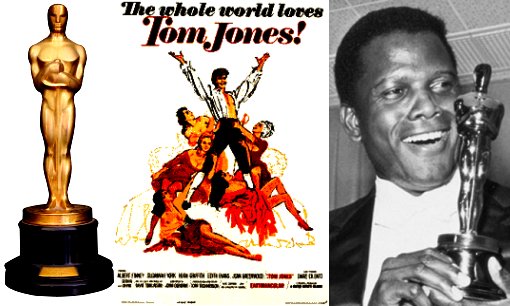 |
| 1964 Best Film: My Fair Lady Nominations: Becket, Dr. Strangelove or: How I Learned To Stop Worrying and Love The Bomb, Mary Poppins, Zorba the Greek Best Actor: Rex Harrison (My Fair Lady) Nominations: Richard Burton (Becket), Peter O'Toole (Becket), Anthony Quinn (Zorba the Greek), Peter Sellers (Dr. Strangelove) Best Actress: Julie Andrews (Mary Poppins) Nominations: Anne Bancroft (The Pumpkin Eater), Sophia Loren (Marriage Italian Style), Debbie Reynolds (The Unsinkable Molly Brown), Kim Stanley (Seance on a Wet Afternoon) Best Supporting Actor: Peter Ustinov (Topkapi) Nominations: John Gielgud (Becket), Stanley Holloway (My Fair Lady), Edmond O'Brien (Seven Days in May), Lee Tracy (The Best Man) Best Supporting Actress: Lila Kedrova (Zorba the Greek) Nominations: Gladys Cooper (My Fair Lady), Edith Evans (The Chalk Garden), Grayson Hall (The Night of the Iguana), Agnes Moorehead (Hush...Hush, Sweet Charlotte) Best Director: George Cukor (My Fair Lady) Nominations: Michael Cacoyannis (Zorba the Greek), Peter Glenville (Becket), Stanley Kubrick (Dr. Strangelove), Robert Stevenson (Mary Poppins) |
 |
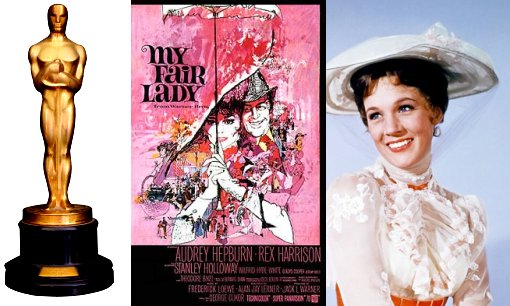 |
| 1965 Best Film: The Sound of Music Nominations: Darling, Dr. Zhivago, Ship of Fools, A Thousand Clowns Best Actor: Lee Marvin (Cat Ballou) Nominations: Richard Burton (The Spy Who Came In From the Cold), Laurence Olivier (Othello), Rod Steiger (The Pawnbroker), Oskar Werner (Ship of Fools) Best Actress: Julie Christie (Darling) Nominations: Julie Andrews (The Sound of Music), Samantha Eggar (The Collector), Elizabeth Hartman (A Patch of Blue), Simone Signoret (Ship of Fools) Best Supporting Actor: Martin Balsam (A Thousand Clowns) Nominations: Ian Bannen (The Flight of the Phoenix), Tom Courtenay (Doctor Zhivago), Michael Dunn (Ship of Fools), Frank Finlay (Othello) Best Supporting Actress: Shelley Winters (A Patch of Blue) Nominations: Ruth Gordon (Inside Daisy Clover), Joyce Redman (Othello), Maggie Smith (Othello), Peggy Wood (The Sound of Music) Best Director: Robert Wise (The Sound of Music) Nominations: David Lean (Doctor Zhivago), John Schlesinger (Darling), Hiroshi Teshigahara (Woman in the Dunes), William Wyler (The Collector) |
 |
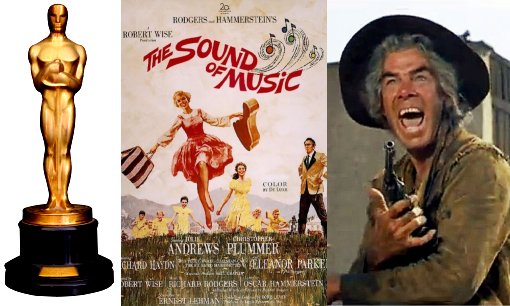 |
| 1966 Best Film: A Man For All Seasons Nominations: Alfie, The Russians are Coming, The Russians are Coming, The Sand Pebbles, Who's Afraid of Virginia Woolf? Best Actor: Paul Scofield (A Man For All Seasons) Nominations: Alan Arkin (The Russians Are Coming), Richard Burton (Who's Afraid of Virginia Woolf?), Michael Caine (Alfie), Steve McQueen (The Sand Pebbles) Best Actress: Elizabeth Taylor (Who's Afraid of Virginia Woolf?) Nominations: Anouk Aimee (A Man and a Woman), Ida Kaminska (The Shop on Main Street), Lynn Redgrave (Georgy Girl), Vanessa Redgrave (Morgan!) Best Supporting Actor: Walter Matthau (The Fortune Cookie) Nominations: Mako (The Sand Pebbles), James Mason (Georgy Girl), George Segal (Who's Afraid of Virginia Woolf?), Robert Shaw (A Man for All Seasons) Best Supporting Actress: Sandy Dennis (Who's Afraid of Virginia Woolf?) Nominations: Wendy Hiller (A Man for All Seasons), Jocelyn Lagarde (Hawaii), Vivien Merchant (Alfie), Geraldine Page (You're a Big Boy Now) Best Director: Fred Zinnemann (A Man for All Seasons) Nominations: Michelangelo Antonioni (Blow-up), Richard Brooks (The Professionals), Claude Lelouch (A Man and a Woman), Mike Nichols (Who's Afraid of Virginia Woolf?) |
 |
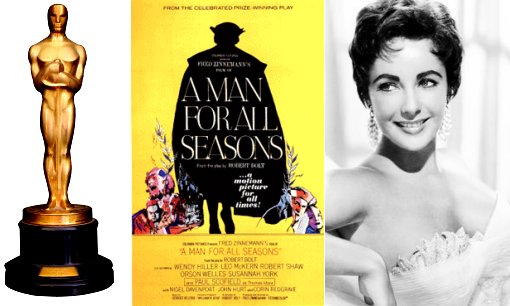 |
|
1967 Best Film: In the Heat of the Night Nominations: Bonnie and Clyde, Doctor Dolittle, The Graduate, Guess Who's Coming to Dinner Best Actor: Rod Steiger (In the Heat of the Night) Nominations: Warren Beatty (Bonnie and Clyde), Dustin Hoffman (The Graduate), Paul Newman (Cool Hand Luke), Spencer Tracy (Guess Who's Coming to Dinner) Best Actress: Katharine Hepburn (Guess Who's Coming to Dinner) Nominations: Anne Bancroft (The Graduate), Faye Dunaway (Bonnie and Clyde), Edith Evans (The Whisperers), Audrey Hepburn (Wait Until Dark) Best Supporting Actor: George Kennedy (Cool Hand Luke) Nominations: John Cassavetes (The Dirty Dozen), Gene Hackman (Bonnie and Clyde), Cecil Kellaway (Guess Who's Coming to Dinner), Michael J. Pollard (Bonnie and Clyde) Best Supporting Actress: Estelle Parsons (Bonnie and Clyde) Nominations: Carol Channing (Thoroughly Modern Millie), Mildred Natwick (Barefoot in the Park), Beah Richards (Guess Who's Coming to Dinner), Katharine Ross (The Graduate) Best Director: Mike Nichols (The Graduate) Nominations: Richard Brooks (In Cold Blood), Norman Jewison (In the Heat of the Night), Stanley Kramer (Guess Who's Coming to Dinner), Arthur Penn (Bonnie and Clyde) |
 |
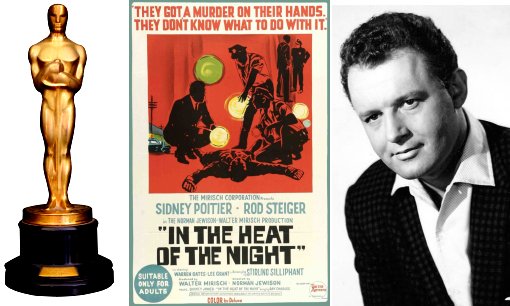 |
|
1968
This was the first year in which the television broadcast was beamed worldwide
- to 37 countries. Best Film: Oliver! Nominations: Funny Girl, The Lion in Winter, Rachel, Rachel, Romeo and Juliet Best Actor: Cliff Robertson (Charly) Nominations: Alan Arkin (The Heart is a Lonely Hunter), Alan Bates (The Fixer), Ron Moody (Oliver!), Peter O'Toole (The Lion in Winter) Best Actress: Tie: Katharine Hepburn (The Lion in Winter) and Barbra Streisand (Funny Girl) Nominations: Patricia Neal (The Subject Was Roses), Vanessa Redgrave (Isadora), Joanne Woodward (Rachel, Rachel) Best Supporting Actor: Jack Albertson (The Subject Was Roses) Nominations: Seymour Cassel (Faces), Daniel Massey (Star!), Jack Wild (Oliver!), Gene Wilder (The Producers) Best Supporting Actress: Ruth Gordon (Rosemary's Baby) Nominations: Lynn Carlin (Faces), Sondra Locke (The Heart is a Lonely Hunter), Kay Medford (Funny Girl), Estelle Parsons (Rachel, Rachel) Best Director: Sir Carol Reed (Oliver!) Nominations: Anthony Harvey (The Lion in Winter), Stanley Kubrick (2001: A Space Odyssey), Gillo Pontecorvo (The Battle of Algiers), Franco Zeffirelli (Romeo and Juliet) |
 |
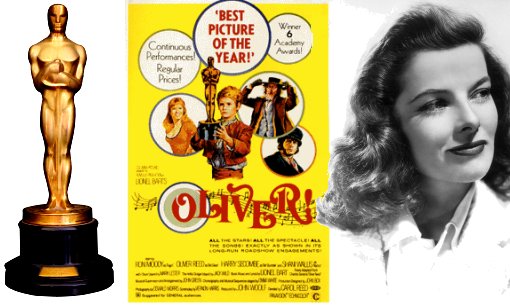 |
| 1969 Best Film: Midnight Cowboy Nominations: Anne of the Thousand Days, Butch Cassidy and The Sundance Kid, Hello Dolly!, Z Best Actor: John Wayne (True Grit) Nominations: Richard Burton (Anne of the Thousand Days), Dustin Hoffman (Midnight Cowboy), Peter O'Toole (Goodbye, Mr. Chips), Jon Voight (Midnight Cowboy) Best Actress: Maggie Smith (The Prime of Miss Jean Brodie) Nominations: Genevieve Bujold (Anne of the Thousand Days), Jane Fonda (They Shoot Horses, Don't They?), Liza Minnelli (The Sterile Cuckoo), Jean Simmons (The Happy Ending) Best Supporting Actor: Gig Young (They Shoot Horses, Don't They?) Nominations: Rupert Crosse (The Reivers), Elliott Gould (Bob & Carol & Ted & Alice), Jack Nicholson (Easy Rider), Anthony Quayle (Anne of the Thousand Days) Best Supporting Actress: Goldie Hawn (Cactus Flower) Nominations: Catherine Burns (Last Summer), Dyan Cannon (Bob & Carol & Ted & Alice), Sylvia Miles (Midnight Cowboy), Susannah York (They Shoot Horses, Don't They?) Best Director: John Schlesinger (Midnight Cowboy) Nominations: Costa-Gavras (Z), George Roy Hill (Butch Cassidy and The Sundance Kid), Arthur Penn (Alice's Restaurant), Sydney Pollack (They Shoot Horses, Don't They?) |
 |
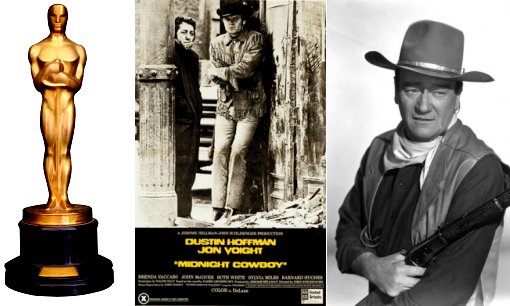 |
|
|
All
Original Material Copyright SixtiesCity
Other individual owner copyrights may apply to Photographic Images |